-
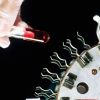 +18 +1
+18 +190% of patients respond to new blood cancer treatment in trial
Anew cancer therapy developed at Jerusalem’s Hadassah-University Medical Center had a 90% response rate in a new clinical trial, with over half of patients going into total remission. The CAR-T therapy — which arms the body’s own immune cells to fight cancer — was able to send multiple myeloma, an extremely deadly cancer that impacts the immune system, into remission.
-
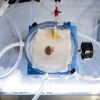 +36 +1
+36 +1Scientists successfully unfroze rat organs and transplanted them — a ‘historic’ step that could someday transform transplant medicine
In an ‘historic’ first, scientists freeze, thaw, and transplant rat organs — bringing transplant medicine one step closer to sci-fi dreams of stopping biological time.
-
 +20 +1
+20 +1The A.I. Revolution Will Change Work. Nobody Agrees How.
The tally of how many jobs will be “affected by” world-changing technology is different depending on who you ask.
-
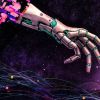 +26 +1
+26 +1Silicon Valley Confronts the Idea That the ‘Singularity’ Is Here
The frenzy over artificial intelligence may be ushering in the long-awaited moment when technology goes wild. Or maybe it’s the hype that is out of control.
-
 +16 +1
+16 +1High-tech pen paints healing gel right into wounds
Most wound dressings simply cover the injury and perhaps also kill harmful bacteria. The PAINT system goes much further, as it incorporates a pen that could one day allow doctors to paint a gelatinous healing ink right into wounds. Its name an acronym for "portable bioactive ink for tissue healing," the PAINT technology is being developed by scientists from China's Nanjing University.
-
 +24 +1
+24 +1New technology uses ordinary sunlight to disinfect drinking water
A low-cost, recyclable powder can kill thousands of waterborne bacteria per second when exposed to sunlight. Stanford and SLAC scientists say the ultrafast disinfectant could be a revolutionary advance for 2 billion people worldwide without access to safe drinking water.
-
 +15 +1
+15 +1US tech policy must keep pace with AI innovation
As innovation in artificial intelligence (AI) outpaces news cycles and grabs public attention, a framework for its responsible and ethical development and use has become increasingly critical to ensuring that this unprecedented technology wave reaches its full potential as a positive contribution to economic and societal progress.
-
 +23 +1
+23 +1Elizabeth Holmes said she still believes Theranos could have revolutionized healthcare and is working on new inventions: 'I still feel the same calling to it'
Holmes told the New York Times she still works on healthcare-related innovations, and plans to continue while serving her 11-year prison sentence.
-
 +29 +1
+29 +1Bill Gates says A.I. chatbots will teach kids to read within 18 months: You'll be 'stunned by how it helps'
Soon, artificial intelligence could help teach your kids and improve their grades. That’s according to billionaire Microsoft co-founder Bill Gates, who says AI chatbots are on track to help children learn to read and hone their writing skills in 18 months time.
-
 +17 +1
+17 +1An experimental cancer trial in France is getting a boost from the Gates Foundation: ‘Potential game-changer’
The Bill & Melinda Gates Foundation is known for spending billions to fight infectious diseases in developing countries, so a new investment in a French biotech company feels somewhat unusual. Smart Immune will receive $5 million from the foundation, according to the Financial Times. The company has developed a thymus-empowered T-cell therapy platform, called ProTcell, “to fully and rapidly re-arm the immune system.”
-
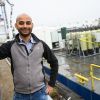 +17 +1
+17 +1'Big sponge': new CO2 tech taps oceans to tackle global warming
Floating in the port of Los Angeles, a strange-looking barge covered with pipes and tanks contains a concept that scientists hope to make waves: a new way to use the ocean as a vast carbon dioxide sponge to tackle global warming. Scientists from University of California Los Angeles (UCLA) have been working for two years on SeaChange—an ambitious project that could one day boost the amount of CO2, a major greenhouse gas, that can be absorbed by our seas.
-
 +23 +1
+23 +1These high-tech diapers double as urine tests
Doctors routinely ask for urine tests for a very good reason: they just work. A urine analysis can reveal essential basic information about a patient’s health and can be used to detect a wide range of common conditions and diseases. Even plainly visible changes in color, odor, and the amount of urine can indicate whether something is wrong.
-
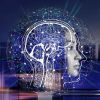 +21 +1
+21 +1Futurist predicts humans will be immortal, identical to AI by 2045
Futurist and former Google engineer Ray Kurzweil said that he believes humans will reach immortality by 2045, according to Youtuber Adagio who discussed Kurzweil's theory in a two-part Youtube series. Kurzweil believes that humanity is moving toward a singularity in 2045 which is powered by exponential growth - a theory that says that when an industry becomes interesting, more resources are invested into it, meaning that more research can be done and causing the industry to advance at greater speeds as time goes on.
-
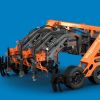 +22 +1
+22 +1AI-powered robots cut out weeds while leaving crops untouched
In farming, weeds can strangle crops and destroy yields. Unfortunately, spraying herbicides to deal with the intrusive plants pollutes the environment and harms human health and there simply aren't enough workers to tackle all the weeds by hand.
-
 +18 +1
+18 +1Researchers Create Plastic Straws from Potato Starch
As the war on plastic straws rages on, researchers in Korea have created a bioplastic alternative that is made out of potato starch and citric acid. In a paper paper published in ACS Omega, the team says that these new straws are stronger than plastic and more durable than paper.
-
 +13 +1
+13 +1Stem cell therapy may reduce risk of heart attack and stroke in certain heart failure patients, study shows
Cell therapy, involving adult stem cells from bone marrow, has been shown to reduce the risk of heart attack and stroke in severe heart failure patients, according to a new study. A single administration of adult stem cells directly into an inflamed heart, through a catheter, could result in a long-term 58% reduced risk of heart attack or stroke among heart failure patients with reduced ejection fraction...
-
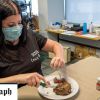 +4 +1
+4 +1Stroke survivor moves her hand for first time in a decade after groundbreaking treatment
Heather Rendulic cries tears of joy as pioneering electrical stimulation gives her enough mobility to complete everyday tasks.
-
 +12 +1
+12 +1Scientists Actually Did It: They Built a Real Working Tractor Beam
One that manipulates objects and everything.
-
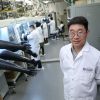 +26 +1
+26 +1Physicists solve durability issue in next-generation solar cells
Physicists in the U.S. jumped a major hurdle standing in the way of the commercialization of solar cells created with halide perovskites as a lower-cost, higher-efficiency replacement for silicon when generating electricity from the sun.
-
 +14 +1
+14 +1The EV transition isn't just about cars – the broader goal should be access to clean mobility for everyone
The race to decarbonize passenger cars and light-duty trucks in the U.S. is accelerating. Battery electric vehicles accounted for almost 6% of all new vehicle sales in 2022, up from close to 3% in 2021, and demand is outstripping supply, even as manufacturers roll out new models and designs. The Biden administration is spending billions of dollars to build out EV charging networks and providing incentives for purchasing new and used EVs.
Submit a link
Start a discussion




















